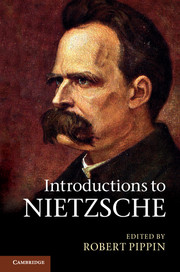
- Publisher:
- Cambridge University Press
- Online publication date:
- June 2012
- Print publication year:
- 2012
- Online ISBN:
- 9781139051736
- Subjects:
- Nineteenth-Century Philosophy, Philosophy
Last updated 10th July 2024: Online ordering is currently unavailable due to technical issues. We apologise for any delays responding to customers while we resolve this. For further updates please visit our website https://www.cambridge.org/news-and-insights/technical-incident


Friedrich Nietzsche (1844–1900) is one of the most important philosophers of the last two hundred years, whose writings, both published and unpublished, have had a formative influence on virtually all aspects of modern culture. This volume offers introductory essays on all of Nietzsche's completed works and also his unpublished notebooks. The essays address such topics as his criticism of morality and Christianity, his doctrines of the will to power and the eternal recurrence, his perspectivism, his theories of tragedy and nihilism and his thoughts on ancient and modern culture. Written by internationally recognized scholars, they provide the interested reader with an up-to-date and authoritative overview of the thought of this fascinating figure.
'… a valuable introduction to key ideas, problems, and works, and will serve as a useful companion to students and scholars using other editions.'
Michael White Source: Year's Work in Modern Language Studies
 Loading metrics...
Loading metrics...
* Views captured on Cambridge Core between #date#. This data will be updated every 24 hours.
Usage data cannot currently be displayed.